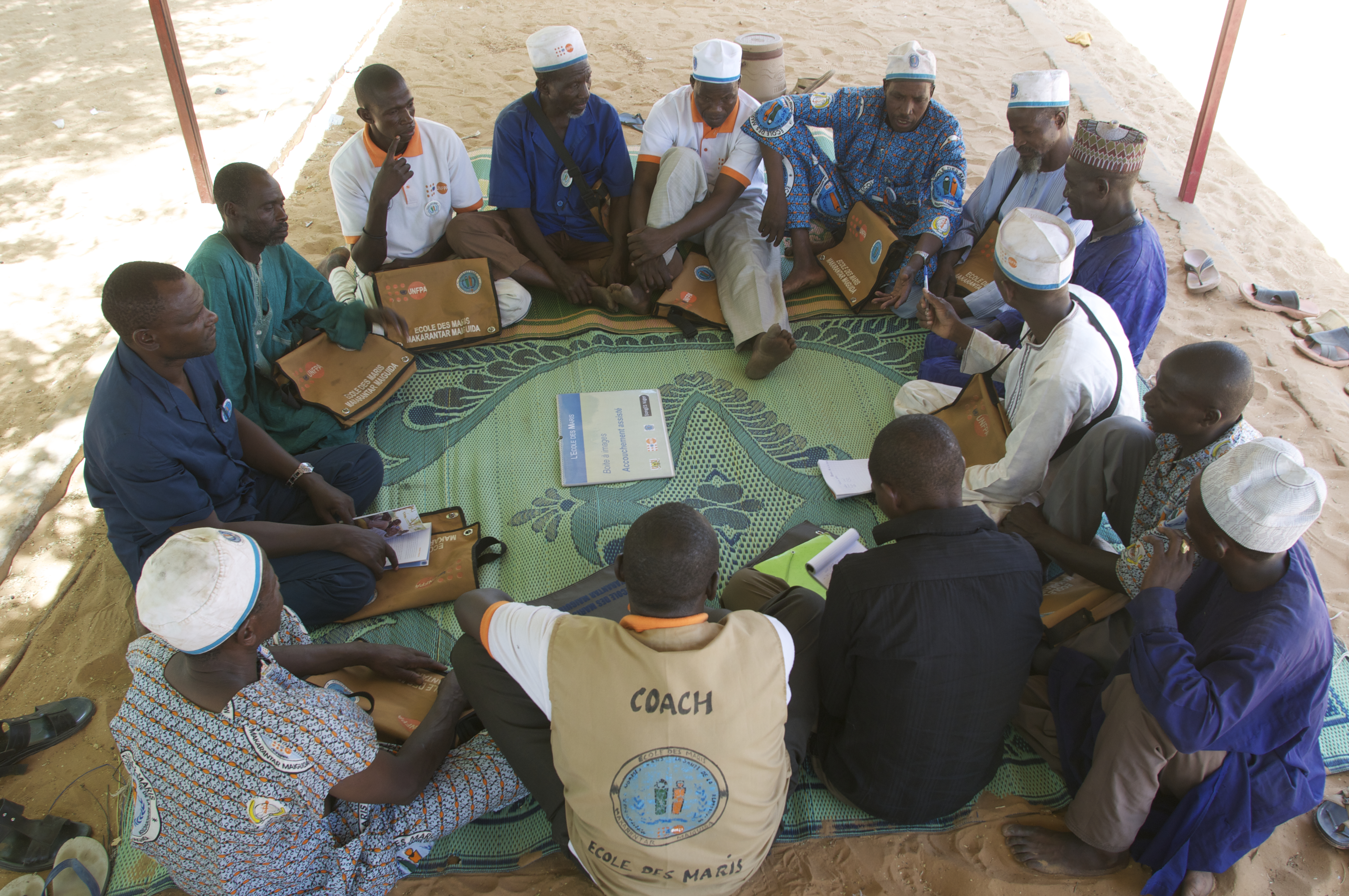 Involving Men in the Promotion of Reproductive Health through Schools for Husbands
Facilitating positive attitudes and behavioural change at the community level by engaging men in the promotion of reproductive health
Involving Men in the Promotion of Reproductive Health through Schools for Husbands
Facilitating positive attitudes and behavioural change at the community level by engaging men in the promotion of reproductive health

Challenges
The importance of male engagement in reproductive health programmes is increasingly recognised in many parts of the developing world. The active participation of men has shown to be positively associated with maternal and child health outcomes. Greater men’s involvement, especially husbands, result in a range of benefits primarily through greater access to reproductive health services and interventions for their wives and children.
In Niger, where the risk of maternal death and rate of child mortality are among the highest in the world, the dominance of men in household and community decision-making, coupled with their lack of knowledge about the advantages of clinical care in childbirth, has been a significant barrier in women’s access to reproductive health services. Many women continue to give birth at home unattended, with deaths of newborn babies and mothers that could have been prevented.
Towards a Solution
The Ministry of Health and Ministry of Women’s Promotion and Child Protection of Niger, in collaboration with the United Nations Population Fund (UNFPA), embarked on an initiative to actively engage husbands by raising their awareness and increasing their knowledge about reproductive health through education, to promote dialogue with their wives regarding family decisions and to train them as agents of change, particularly among their male peers, and the community at large.
Schools for Husbands (Écoles des Maris, EDM) were set up to educate men on the importance of reproductive health and foster behaviour change at the community level. The interaction between husbands gave the members insight into how they perceive maternal health issues and can be a tool for changing behaviour. The schools consisted of groups of 12 husband volunteers and each one is attached to a health centre. Two local NGOs engaged in capacity building and community work - SONGES and the Association Nigérienne pour le Bien-Etre Familial's (ANBEF) - supervise the schools.
The school activities include, among others, knowledge sharing about reproductive health services, such as prenatal care and contraceptive methods; sensitization and advocacy sessions; developing action plans; and developing partnerships with key stakeholders in the community, particularly those in health service delivery. Local health officials, midwives and religious leaders are invited as resource persons.
Results
The use of family planning services have tripled in communities where the schools operate with increased number of prenatal consultations and antenatal visits at the health centres, childbirths attended by skilled healthcare personnel, and safe delivery.
The EDM participants have not only gained a better understanding of women’s health issues, particularly those relating to reproductive health, but have led to positive behaviour with husbands serving as role models at home and in the community, as well as in neighbouring areas and villages.
Given the success of the EDM initiative, Niger has shared its experience, including lessons learned, to several other African countries, such as Burkina Faso, Cameroon, Côte d’Ivoire, Guinea, Mali, Mauritania, Senegal, Sierra Leone and Togo. In line with the South-South cooperation modality, these countries sent participants from government and civil society for a cross-country exchange on establishing husbands’ school to promote women’s access to reproductive health information and services.
Lessons Learned
The Schools for Husbands initiative has been adopted by international NGOs, such as Save the Children, Population Services International and Concern, among others. Noteworthy is that health centres that achieve the best results are those where healthcare workers have good relations with local people and, in particular, with the Schools for Husbands.
Contact Information
Countries involved
Supported by
Implementing Entities
Project Status
Project Period
Primary SDG
Primary SDG Targets
Secondary SDGs
Secondary SDG Targets
Similar Solutions
| NAME OF SOLUTION | Countries | SDG | Project Status | |
|---|---|---|---|---|
A Billion Brains: Smarter Children, Healthier Economies High Level Meeting on South-South Cooperation for Child Rights |
Burkina Faso, Cameroon, Côte D'Ivoire, Guinea, Mali, Mauritius, Senegal, Sierra Leone, Togo | 17 - Partnerships for the Goals | Completed | View Details |
Accelerating the Transformational Shift to a Low-Carbon Economy in Mauritius Towards supplying 35 percent of the country’s energy needs with renewables by 2025 |
Burkina Faso, Cameroon, Côte D'Ivoire, Guinea, Mali, Mauritius, Senegal, Sierra Leone, Togo | 05 - Gender Equality 09 - Industry, Innovation and Infrastructure 13 - Climate Action | Ongoing | View Details |
Accelerator Labs Network Following collective intelligence methods to address emerging sustainability challenges and the growing demand for local solutions |
Burkina Faso, Cameroon, Côte D'Ivoire, Guinea, Mali, Mauritius, Senegal, Sierra Leone, Togo | 08 - Decent Work and Economic Growth 13 - Climate Action | Ongoing | View Details |
Accessibility of Financial Services and the Private Sector in Africa Maximizing the impact of financial cooperation on economic development and industrialization in Africa |
Burkina Faso, Cameroon, Côte D'Ivoire, Guinea, Mali, Mauritius, Senegal, Sierra Leone, Togo | 08 - Decent Work and Economic Growth | Completed | View Details |
ACP Business-friendly Supporting business-friendly and inclusive national and regional policies, and strengthening productive capabilities and value chains |
Burkina Faso, Cameroon, Côte D'Ivoire, Guinea, Mali, Mauritius, Senegal, Sierra Leone, Togo | 08 - Decent Work and Economic Growth 17 - Partnerships for the Goals | Ongoing | View Details |
